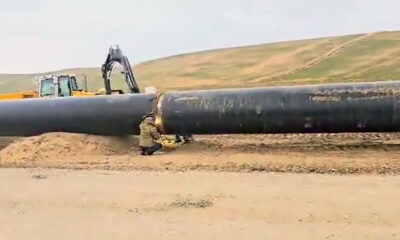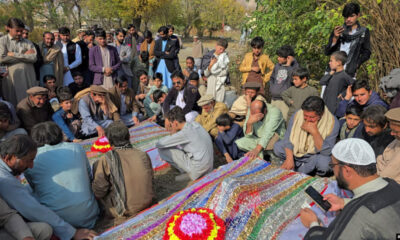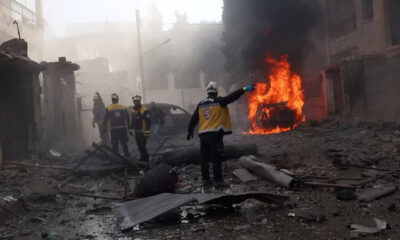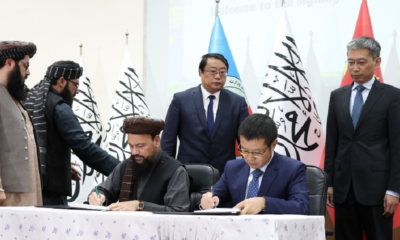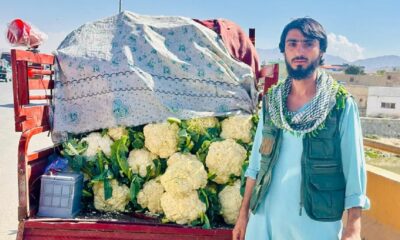Climate Change
Malaysia and Thailand brace for second wave of heavy rain and possible flooding
Authorities say these have been the worst floods in decades, resulting in the death of at least 27 people across the two countries.

Malaysia and Thailand are facing a second wave of heavy rain and potential flooding this week, authorities said Monday following days of torrential rain that caused massive flooding in northern Malaysia and southern Thailand.
Authorities say these have been the worst floods in decades, resulting in the death of at least 27 people across the two countries.
Malaysia alone was forced to evacuate over 150,000 people on Sunday and rivers burst their banks and water levels steadily increased.
By Monday, authorities said the immediate situation had improved in some areas and water levels had eased but weather experts warned that more rain and possible floods were forecast again for Wednesday.
The northeastern state of Kelantan, which has been the worst hit, was also expected to face a fresh deluge from Wednesday, December 4.
Climate Change
NEPA chief reports back on Afghanistan’s attendance at COP29
Afghanistan is known for its vast mineral deposits, including lithium which is needed for batteries for the green transition
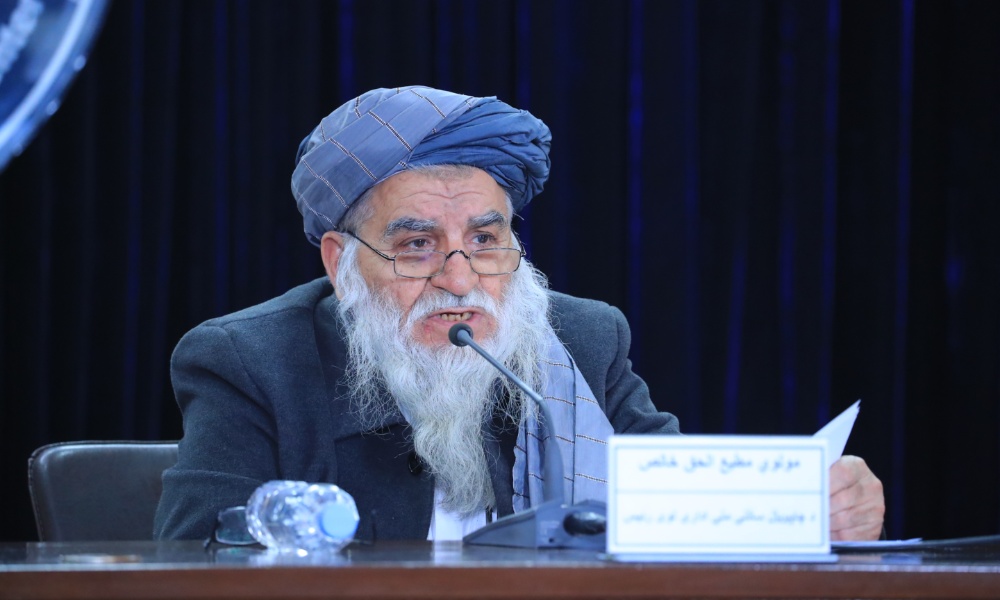
The head of Afghanistan’s National Environmental Protection Agency Mati-ul-Haq Khalis says comprehensive discussions were held at the recent COP29 summit on Afghanistan’s vulnerabilities to climate change.
He stated that the participation of IEA’s delegation at (COP29) marks a significant milestone, presenting a comprehensive and transparent overview of Afghanistan's current environmental and climatic conditions to the global community.
“During COP29, concerted efforts were made to emphasize that climate change and environmental challenges transcend political considerations,” Khalis said in a statement.
He said the delegation urged the international community to treat these issues as critical social and humanitarian concerns.
This was the first time that Afghanistan was able to send a delegation to the annual UN climate summit since the Islamic Emirate’s takeover in August 2021.
According to Khalis, the delegation meanwhile used the opportunity to emphasize the need for urgent implementation of effective mechanisms to combat adverse effects of climate change and called for the acceleration of financial assistance in this regard.
The IEA delegation also advocated for enhanced engagement, coordination, and collaboration among relevant stakeholders in the fight against climate change, and advocated for Afghanistan’s active participation in regional and international forums.
Khalis said Afghanistan’s representatives also stressed the urgency of resuming suspended environmental and climate-related projects, which are crucial for addressing the country’s climate challenges.
“By introducing Afghanistan’s national focal point for the Green Climate Fund, the delegation sought to garner international support for the effective governance and management of environmental projects within the country,” Khalis stated.
Milestone for Afghanistan
Last year, the COP28 conference was held in the United Arab Emirates, but the Islamic Emirate was excluded. However, this year, Azerbaijan authorities decided to include an official delegation.
Afghanistan remains one of the most vulnerable countries to climate change and also has major environmental challenges.
But some experts believe that the rationale in some quarters for engaging with Afghanistan on environmental policy is its potential for resourcing key minerals for the green transition - key to this being Afghanistan’s enormous lithium deposits.
Lithium has certain unique properties which make it very suitable as a metal for batteries needed for the green transition, an a Chinese company recently expressed interest in investing $10 billion in Afghanistan’s lithium resources in the south.
The Islamic Emirate stated that the lithium deal would generate up to 120,000 direct and many more indirect jobs in the country.
Afghanistan has long been known for its wealth of mineral resources and the Ministry of Mines and Petroleum estimates it may hold 60 million tons of copper, 2.2 billion tons of iron ore, 1.4 million tons of rare earth elements such as lanthanum, cerium and neodymium, and vast amounts of aluminum, gold, silver, zinc, mercury, and lithium.
Climate Change
COP29’s $300 billion deal ‘insufficient’ to fight climate change
After days of negotiations in Azerbaijan, rich countries agreed to raise their contribution from $250 billion to $300 billion a year by 2035

The finance agreement reached at the COP29 summit late Sunday night has sparked outrage around the world as countries criticize negotiators for failing to meet the scale of the challenge.
After days of negotiations in Azerbaijan, rich countries agreed to raise their contribution from $250 billion to $300 billion a year by 2035.
According to BBC, the African Group of Negotiators described it as "too little, too late"; the representative from India dismissed the money as "a paltry sum" and a group of NGOs warned that the $300 billion pledge does not go far enough to help those most vulnerable to climate change.
Poorer countries had asked for $1.3 trillion to help them fight the climate battle.
Meanwhile, China and India are still defined by the United Nations as "developing" countries and as a result they have no formal obligation to cut their greenhouse gas emissions or to provide financial help to poorer countries.
Both countries are technically eligible to receive climate aid, although China chooses not to do so. Beijing, one of the world's largest economies, does step in to support countries with the impact of global warming, via bilateral agreements.
India, however, does accept support from "developed" nations.
Speaking to BBC, one source said there had been one positive during the summit. This was China.
"The only bright spot in all of this is China," the source said.
According to him, not only was Beijing’s negotiating style markedly different to previous years, but "China could be stepping forward".
In the past, China has released minimal information about its climate policies and plans, but this year, for the first time, officials said they have paid developing countries more than $24 billion for climate action since 2016.
“That’s serious money, almost nobody else is at that level,” another COP insider said.
Where does Afghanistan fit into this?
Afghanistan is considered one of the most vulnerable countries when it comes to climate change and for the first time in three years, the Islamic Emirate was able to participate at the summit.
Leading a delegation to COP29 was Matuil Haq Khalis, who’s head of the country’s environment protection agency. He said Afghanistan needs international support to deal with extreme weather like erratic rainfall, prolonged droughts and flash floods.
“All the countries must join hands and tackle the problem of climate change,” said Khalis.
Afghanistan has been hard hit by climate change, with a recent assessment by experts ranking it the sixth most climate vulnerable country in the world.
In March, northern Afghanistan experienced heavy rains resulting in flash floods, killing over 300 people. Climate scientists have found that extreme rainfall has gotten 25% heavier over the last 40 years in the country.
Khalis meanwhile said Afghanistan has prepared national action plans to deal with climate change and will be updating its climate goals within the next few months.
Contributing nations
There are 23 “developed” nations, which are industrialized countries with a strong economy, that have to contribute and reach the annual target of $300 billion.
However, many developed countries want to see this group expanded, arguing that the global landscape has shifted a lot since these classifications were drawn up as part of the original UN Framework Convention on Climate Change in 1992.
China, India and the Gulf states, for example, are still classed as developing nations despite their increasing contributions to global warming.
Outcry over deal reached
Sunday’s night’s finance deal has sparked heated reaction from developing nations but some global leaders, however, maintain that the agreement will keep climate action going.
US President Joe Biden said: "While there is still substantial work ahead of us to achieve our climate goals, today’s outcome puts us one significant step closer".
EU Climate Commissioner Wopke Hoekstra, who attended the talks, said COP29 "will be remembered as the start of a new era on climate finance" and the deal was "an ambitious and realistic goal and an increased contributor base".
UN Secretary General Antonio Guterres said: "I had hoped for a more ambitious outcome - on both finance and mitigation - to meet the scale of the great challenge we face, but the agreement reached provides a base on which to build."
But for many others, the deal was not welcomed.
ActionAid UK described the agreement as "a complete catastrophe and farce" and warned the amount is "a drop in the ocean" compared with "the trillions needed to help climate-hit communities".
Environmental group Friends of Earth said the talks have "failed to solve the question of climate finance", adding that developing nations are being "hammered by climate extremes"
India’s representative meanwhile lashed out and said the $300 billion deal showed that intense frustration still remained over the agreement.
“We cannot accept it … the proposed goal will not solve anything for us. [It is] not conducive to climate action that is necessary to the survival of our country,” Chandni Raina told the conference, saying the amount was too small.
Raina said the decision-making process was unfair and excluded nations, a comment which was met with cheers and applause in the room.
Meanwhile, Nigeria's envoy Nkiruka Maduekwe described the deal as an "insult".
Climate Change
COP29 climate talks: What is needed for a deal by Friday’s deadline?
The talks, which began on Nov. 11, are due to end on Friday at 2pm but COP summits have a history of running long,
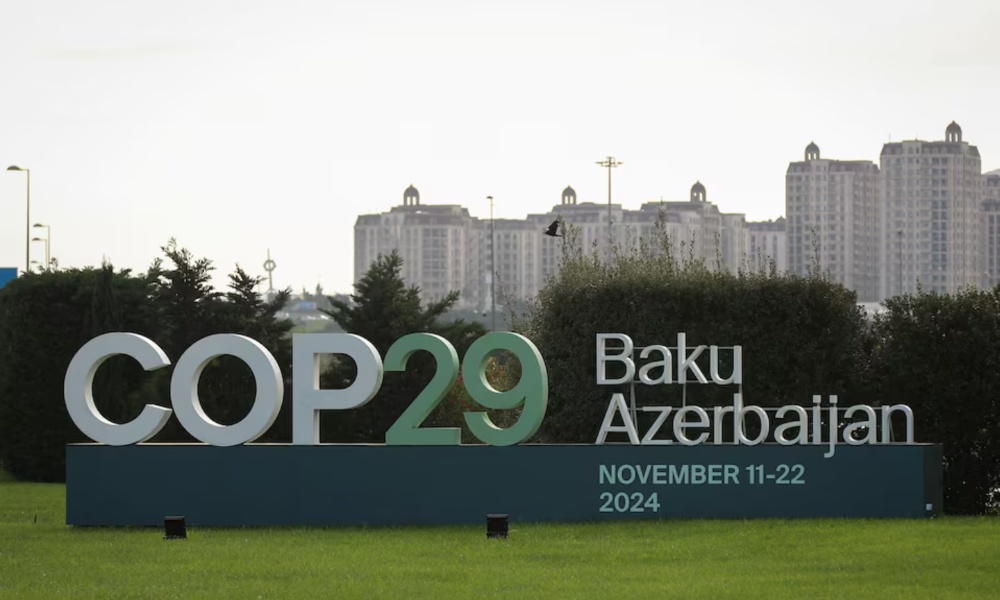
Marathon COP29 climate talks enter their final stretch on Wednesday when the Azerbaijani hosts are due to publish an update on negotiations so far as the summit seeks to agree a new goal on issues including climate finance.
The talks, which began on Nov. 11, are due to end on Friday afternoon but COP summits have a history of running long, Reuters reported.
Below is a breakdown of the known sticking points and what happens next:
DRAFT TEXTS
Officials spent the first week trying to agree to deals across a range of different issues including finance, carbon markets, the future of fossil fuels and efforts to mitigate the rise in global temperatures.
Now, the outstanding items have been handed over to ministers so they can use their political clout to try to get agreements across the line.
The next steps are about trying to whittle down draft texts containing a huge range of wording options into a final document that can be adopted by consensus at the end of the summit.
Draft texts will be published periodically by the Azerbaijani presidency as they zero in on an acceptable deal.
CLIMATE FINANCE GOAL
The primary aim of COP29 is to agree a new target for how much money should be provided to developing countries to help them adapt to climate-fuelled weather disasters and transition to cleaner energy systems.
A previous goal to provide $100 billion per year expires in 2025. The new goal needs to be $1 trillion annually by the end of the decade, according to experts.
The focus in the negotiating rooms has been on defining the structure of a new target, including what counts as climate finance and who needs to pay in. Only once that is agreed are parties expected to start talking about the size of the target.
Issues to iron out include whether countries such as China should be counted among the richer core donors, and the degree to which countries should provide finance in the form of grants or loans.
A text has been scheduled for publication on Wednesday evening.
FOSSIL FUELS
Countries have so far struggled to agree on the right way to follow up on a deal at last year's summit to transition from fossil fuels.
European states want to see that commitment referenced throughout any deal at Baku to reinforce the importance of following through with firm action. Others, including the Arab Group of states, argue it does not need to be.
If past COPs are anything to go by, the moment any deal text is published, delegates will be searching for the phrase "fossil fuels" to see if there is any sign of backsliding.
CARBON MARKETS
Talks in Baku began with an early deal on some of the quality standards that would govern a global market for carbon credits, but there is still much to be agreed on, including how to track trades and disclosure rules.
If fully agreed, market watchers expect a U.N.-backed global market could fund billions of dollars of projects that reduce greenhouse gas emissions from projects such as reforestation.
Scrutiny of the details is intense amid concern that without watertight regulation carbon credits may not deliver the benefits they claim.
FINAL HOURS
COPs rarely finish on time. COP28 in Dubai closed almost a full day after the initial deadline; COP27 in Egypt overran by around 36 hours.
In the final hours, delegations consult intensively in private with the presidency on the proposed deal, often through the night, in search of something that can be adopted by consensus.
Once finalised, every country is called to the main hall to begin an hours-long process of formal approval.
-

 Sport4 days ago
Sport4 days agoATN to broadcast upcoming FIFA Club World Cup 2025 draw
-
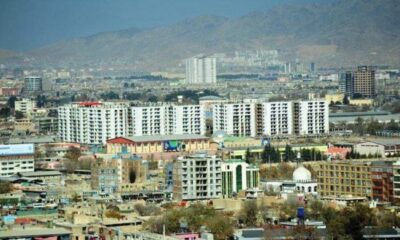
 Latest News4 days ago
Latest News4 days agoJustice ministry cracks down on usurped land in Kabul city’s Sherpur area
-

 Latest News4 days ago
Latest News4 days agoUNAMA convenes inaugural meeting of working group on counter narcotics
-

 World4 days ago
World4 days agoBodies of four migrants recovered after boat sinks between Turkey and Greece
-
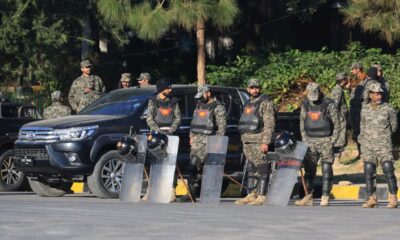
 Latest News4 days ago
Latest News4 days agoPakistan bans stay of Afghans without NOC in Islamabad from 2025
-
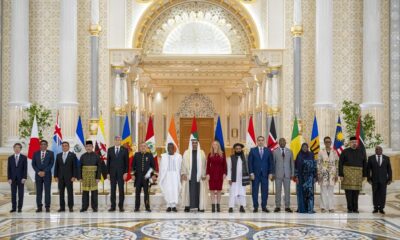
 Latest News4 days ago
Latest News4 days agoUAE president receives credentials of IEA ambassador
-

 Latest News5 days ago
Latest News5 days agoG7 commits to providing humanitarian aid and support to Afghanistan
-

 Latest News3 days ago
Latest News3 days agoPakistan’s First Lady: World should not dictate to IEA, but opt engagement


